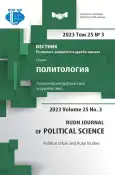The Leadership in the Institutional System of Rural Development Policy: The Results of the Empirical Study in Krasnodar Region
- 作者: Miroshnichenko I.V.1, Samarkina I.V.1, Tereshina M.V.1
-
隶属关系:
- Kuban State University
- 期: 卷 25, 编号 3 (2023): Political Urban and Rural Studies
- 页面: 677-698
- 栏目: THE “DIFFICULT CHILD” OF POLITICAL SCIENCE: THE DISCOURSE OF RURALISTICS
- URL: https://journal-vniispk.ru/2313-1438/article/view/322221
- DOI: https://doi.org/10.22363/2313-1438-2023-25-3-677-698
- EDN: https://elibrary.ru/SKSPOF
- ID: 322221
如何引用文章
详细
There is a lack of explanatory models and analytical tools for studying the role of intangible resources in rural development. Based on the results of theoretical modeling and empirical data from independent field studies, the article identifies and characterizes the leadership potential in the institutional system of rural development in the Krasnodar region. The multilevel analysis of leadership as an important component of intangible resources for rural development reveals the considerable potential of a set of resources (human, personal, professional, network, and institutional), which at present is not fully realized in the system of rural development institutions in the Krasnodar region. Leadership as an intangible development resource achieves the greatest effect when it comes to the creation of leadership communities and the institutional practices of their functioning as territorial development institutions. Regional and local identity act as the foundation and significant factors determining the leaders’ orientation towards involvement in the territorial development policies and building systems of human capital formation in rural communities, which can become one of the main directions for regional development strategies.
作者简介
Inna Miroshnichenko
Kuban State University
编辑信件的主要联系方式.
Email: mirinna78@mail.ru
ORCID iD: 0000-0002-2650-6662
Doctor of Political Science, Head of the Department of Public Policy and Public Administration
Krasnodar, Russian FederationIrina Samarkina
Kuban State University
Email: smrkn@mail.ru
ORCID iD: 0000-0002-0205-8543
Doctor of Political Science, Head of the Department of Political Science and Political Management
Krasnodar, Russian FederationMaria Tereshina
Kuban State University
Email: mwstepanova@mail.ru
ORCID iD: 0000-0001-8982-5831
Doctor of Economics, Professor of the Department of Public Policy and Public Administration
Krasnodar, Russian Federation参考
- Balatsky, E.V., Ekimova, N.A., & Yurevich, M.A. (2019). Development of regions and municipalities formation of regional development institutes in Russia. Municipal Academy, (3), 95-100.
- Bardin, A.L., & Sigachev, M.I. (2019). Discourses of development: Social and humanitarian aspects. Analysis and forecasting. IMEMO Journal, (4), 24-41. (In Russian). https://doi.org/10.20542/afij-2019-4-24-41
- Cloke, P., Marsden, T., & Mooney, P. (Eds.). (2006). Handbook of rural studies. London: Sage Pub. Collinge, C., Gibney, J., & Mabey, C. (2010). Leadership and place. Policy Studies, 31(4), 367-378.
- Filyak, M.S. (2015). Social factors of sustainable community development in Uregionne based on empirical research. Vestnik of Saint Petersburg University, Ser. 12, 1, 137-146. (In Russian).
- Fischer, A., & McKee, A. (2017). A question of capacities? Community resilience and empowerment between assets, abilities, and relationships. Journal of Rural Studies, (54), 187-197.
- Flora, J.L., Sharp, J., Flora, C., & Newlon, B. (1997). Entrepreneurial social infrastructure and locally initiated economic development in the nonmetropolitan United States. The Sociological Quarterly, 38(4): 623-645. https://doi.org/10.1177/0002716293529001005
- Fredericksen, P.J. (2004). Building sustainable communities: Leadership development along the U.S.-Mexico Border. Public Administration Quarterly, 28(1/2), 148-181.
- Grint, K. (2010). Placing leadership. Policy Studies, 31(4), 365-366. https://doi.org/10.1080/01442871003723226.
- Hawley, L.R., Koziol, N.A., Bovaird, J., McCormick, C.M., Welch, G.W., Arthur, A.M., et al. (2016). Defining and describing rural: Implications for rural special education research and policy. Rural Special Education Quarterly, 35(3), 3-11.
- Lyska, A.G. (2013). Concept of local community constructing in international academic writing. Sociological Studies, (7), 99-104. (In Russian).
- Marango, S., Bosworth, G., & Curry, N. (2021). Applying neo-endogenous development theory to delivering sustainable local nature conservation. Sociologia Ruralis, 61(1), 116-140. https://doi.org/10.1111/soru.12315
- McElwee, G., Smith, R., & Somerville, P. (2018). Conceptualizing animation in rural communities: The village SOS Case. Entrepreneurship & Regional Development, 30(1-2), 1-26. https://doi.org/10.1080/08985626.2017.1401122
- Miroshnichenko, I.V., & Morozova, E.V. (2022). Public policy as a space for converting intangible resources into factors of territorial development. Political science, (3), 144-163. (In Russian). https://doi.org/10.31249/poln/2022.03.07
- Miroshnichenko, I.V., Morozova, E.V., Rakachev, V.N., & Samarkina, I.V. (2022). Intangible resources in rural development policy: Conceptualization experience. In T.A. Hagurov, V.N. Rakachev, Ya.V. Rakacheva, A.S. Yevtushenko, & N.E. Hagurova (Eds.), Ethnos and Society in The Context of Interethnic Relations: Materials of The VIII All-Russian (With International Participation) Scientific and Practical Conference (pp. 152-158). Krasnodar: Kuban State University. (In Russian).
- Mirzoyan, V.A. (2013). Management and leadership: Comparative analysis of leadership theories. Russian Studies in Philosophy, (6), 5-11. (In Russian).
- Morozova, E.V., Miroshnichenko, I.V., & Semenenko, I.S. (2020). Identity policies in rural local community development in Russia. Polis. Political Studies, (3), 56-77. (In Russian). https://doi.org/10.17976/jpps/2020.03.05
- Olmedo, L., & O’Shaughnessy, M. (2022). Community-based social enterprises as actors for neo-endogenous rural development: A multi-stakeholder approach. Rural Sociology, (87), 1191-1218. https://doi.org/10.1111/ruso.12462
- Ray, C. (2000). Endogenous socio-economic development in the European Union - Issues of evaluation. Journal of Rural Studies, 16(4), 447-458. https://doi.org/10.1016/ S0743-0167 (00)00012-7.
- Ray, C. (2001). Culture economies: A perspective on local rural development in Europe. Newcastle upon Tyne: Centre for Rural Economy, Dept. of Agricultural Economics and Food Marketing, University of Newcastle upon Tyne.
- Samsonova, T.N., & Shpuga, E.S. (2016). The challenges political leadership faces in the modern world. Moscow State University Bulletin. Series 18. Sociology and Political Science, (4), 142-163. (In Russian).
- Semenenko, I.S. (2019). The rural local community in development policies in Europe: Discourse and agency. South-Russian Journal of Social Sciences, (3), 6-27. (In Russian). https://doi.org/10.31429/26190567-20-3-6-27
- Semenenko, I.S. (2021). Rethinking development in social sciences: On the threshold of an ethical turn. Polis. Political Studies, (2), 25-45. (In Russian). https://doi.org/10.17976/jpps/2021.02.03
- Semenenko, I.S., & Khaynatskaya, T.I. (2022). Well-being discourses in an environment of “unsustainable development”: Bridging the past and the future. Social Sciences and Contemporary World, (5), 76-99. (In Russian). https://doi.org/10.31857/S0869049922050045
- Sotarauta, M. (2010). Regional development and regional networks; the role of regional development officers in Finland. European Urban and Regional Studies, 17(4), 387-400. https://doi.org/10.1177/0969776409352581
补充文件









